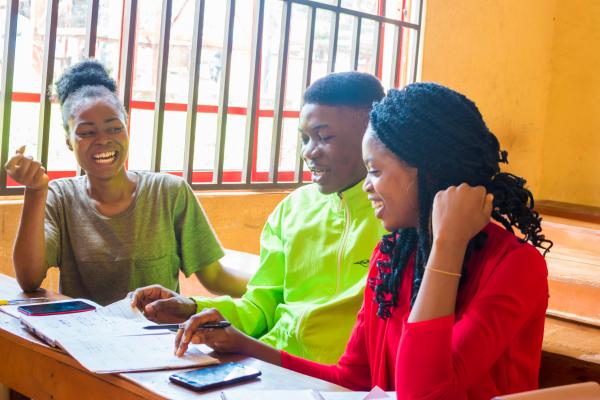Why inclusive education is the cornerstone of climate resilience
By Danielle Cornish-Spencer, SDDirect Head of Portfolio Equal Education, and Jummai Joseph, GESI and Safeguarding State Advisor, PLANE
SDDirect is a leading provider of technical advice, support and research on equal education. This includes on girls’ education; disability inclusion; Gender-Based Violence (GBV) and safeguarding; education in Fragile and Conflict-affected Situations (FCAS); citizen voice and accountability; and monitoring, evaluation and learning (MEL).

Our vision for education is a world that provides high quality, safe and inclusive education for all.
The 4th Sustainable Development Goal is to ensure an inclusive and equitable quality education and promotion of lifelong learning opportunities for all. However, millions of children around the world are still unable to access education due to poverty, conflict or natural disasters. Girls, children with disabilities, and other marginalised groups are the worst affected. Our approach is to ensure that all children, including girls, children with disabilities, marginalised young people and their communities have safe and equitable access to a good quality education. We ensure education is inclusive for all, which will lead to a better education for everyone.
Developing a stronger understanding and approach to safeguarding across the education sector, within schools and Ministries
Prevention and response to school related GBV, with a focus on gendered and intersectional analysis
Improving equitable access to education in FCA situations through addressing barriers
Supporting more accountable governance in the education sector
Ensuring the voices of girls children and young people with disabilities, and structurally marginalised young people and their communities are listened to and reflected in the solutions developed
Effective research, monitoring, evaluation and learning to share evidence on what works to achieve equitable and inclusive access to a safe, quality education for all.
If you would like to hear more about our work on Equal Education, please reach out to Danielle Cornish-Spencer, Head of Equal Education Portfolio, danielle@sddirect.org.uk
By Danielle Cornish-Spencer, SDDirect Head of Portfolio Equal Education, and Jummai Joseph, GESI and Safeguarding State Advisor, PLANE
The Importance of Non-Government and Government Collaborative Efforts to advance Equal Education: Enhancing Gender Equality and Social Inclusion
With the Education World Forum taking place next week in London, 120 Ministers from 114 countries will come together to try to answer the forum’s overarching question: ‘How should we prioritise policy and implementation for Stronger, Bolder, Better, Education?’
This review of national education strategies in East Africa and the Pacific explores the current and comparative risks for under-18s in the region from online sexual abuse and exploitation. It looks at the specific vulnerabilities and drivers for abuse, and how these can be prevented through education strategies.
This briefing paper aims to present the views of the Education Working Group (EWG) of British Expertise International (BEI) working on the frontline of the "Covid-19 education crisis". The paper shares the EWG's experience and expertise, and outlines interventions to the crisis, and how EWG members might be able to support in implementing these.
When I think back to my time at school here in the UK, I struggle to remember a point in which the curriculum or general personal, social, health and economics (PSHE) sessions, ever included discussion about gender identity and sexual orientation. During sex education in both Year 6 and Year 9, there was no reference to LGBTQI+ people for example. This was most likely because of Section 28, the damaging legislation that prohibited discussion of LGBTQ+ in schools between 1988 and 2003 in the UK.
ESSPIN was one of a set of UK Aid-funded State Level Programmes (SLPs) in Nigeria, working in governance, accountability and the delivery of health and education services. ESSPIN started with a pilot in 2,000 schools rapidly expanding to over 16,000 schools by 2017. The £124m programme was managed by a consortium led by Cambridge Education.
SDDirect provides technical leadership and support on an integrated approach to gender equality, social inclusion and safeguarding across all outcome and output areas of the programme, as part of the PLANE Consortium led by international development company DAI.
Danielle joined SDDirect’s technical team in 2019, and works as the Head of Portfolio for Equal Education and Principal Consultant in Safeguarding.
As Deputy Technical Director, Barry Smith co-leads SDDirect’s consultancy and research staff.

